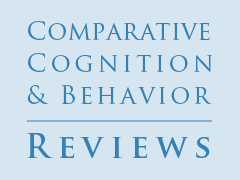Comparative Cognition Needs to Focus More on Outreach
Abstract
Finding support for the field of comparative cognition in an environment with a strong anthropocentric bent can be an uphill battle. Support may be strengthened via dissemination of findings outside typical academic channels, as they may demonstrate widely the relevance of our contributions. Outreach may also foster new or more impactful contributions, from improvements in animal welfare to the promotion of positive societal changes.
Keywords: comparative cognition, science communication, anthropocentrism, animal welfare
Humans have historically shown a strong inclination to believe that there must be something exceptional about us: We, obviously, stood at the center of the universe (or at least of our solar system); we were, naturally, completely disconnected from other animals, and not a product of the same evolutionary process. Science has been fundamental in correcting assumptions of this kind, repeatedly reframing our worldview. Nowadays, claims of exceptionality do not reside so much on where we stand or how we came to be but are focused on cognitive abilities; they may lead to overstating our own cognitive abilities (e.g., overestimating the reliability of our memory, the rationality of our decisions, the impartiality of our positions) and understating the abilities of other species.
A frequent episode comes to mind: When a student, after joining our laboratory, shares with friends or family the work we do, the student is commonly met with surprise—surprise at how nonhuman animals can learn a simple discrimination, or how they are sensitive to durations or quantities. This example is anecdotal, but I suspect there is a significant gap between the general public’s knowledge of animal cognition and what is common fact to those who study comparative cognition. Looking ahead, I believe that bridging this gap in knowledge deserves a stronger effort on our part for several reasons.
First, our knowledge of other species’ abilities affects our attitudes and how we relate to those species (e.g., Higgs et al., 2020). A better-informed understanding of the cognitive abilities of other species—and how, in several aspects, they can be comparable to our own (e.g., Zentall, 2023)—can affect positively the way we treat other species. Fish are a good example of a taxon that, despite intensive exploration by humans, has been historically underestimated in their cognitive abilities and pain perception (e.g., Brown, 2015; Vila Pouca & Brown, 2017). The wider the dissemination of our findings, the more likely that improvements in animal welfare are to come about.
Second, comparative work evinces that each species has its own specializations and limitations, and we are no exception. If this point is well established, it could make the general population more amenable to the idea that the study of other species may also help us better understand our own, by reframing assumptions we may have about ourselves (e.g., Davis, 1997). Not only that, but widespread awareness of our limitations and biases leaves us better equipped to counteract them.
Third, the idea that our species is separated from nature—and thus human and nonhuman cognitive processes have few (or no) commonalities—is a major threat to the field of comparative cognition, but it also reveals one of the most important contributions we can make at a societal level. At a time when it is imperative to rethink our relationship with the planet, the study of nonhuman animals can play a fundamental role in establishing bridges between us and other species. The communication of these commonalities may solidify a worldview that stresses our place within Earth’s ecosystems, which may in turn promote positive, pro-environmental changes.
Finally, dissemination efforts may also benefit the field itself. Revealing the many ways in which the study of nonhuman cognition can be relevant and impactful may bring about more opportunities for funding and student recruitment. Not only that, but wider dissemination may improve the chances of our findings reaching more of our colleagues from other fields with overlapping interests—which may not only promote cooperative work but also prevent findings already known in one field to have to be “rediscovered” in another.
In closing, for the reasons presented, we should try to ensure that our findings reach as general an audience as possible. (Boysen, 2009, is a good example of accessible presentation of not only comparative cognition findings but also the science behind them.) In the examples provided at the beginning of this article, the tasks of sharing the science, of educating, of reframing our worldview fell to astronomers and biologists; I believe a similar responsibility falls into our hands now.
References
Boysen, S. (2009). The smartest animals on the planet: Extraordinary tales of the natural world’s cleverest creatures. A&C Black.
Brown, C. (2015). Fish intelligence, sentience and ethics. Animal Cognition, 18, 1–17. https://doi.org/10.1007/s10071-014-0761-0
Davis, H. (1997). Animal cognition versus animal thinking: The anthropomorphic error. In R. W. Mitchell, N. S. Thompson, & H. L. Miles (Eds.), Anthropomorphism, anecdotes, and animals (pp. 335–347). State University of New York Press.
Higgs, M. J., Bipin, S., & Cassaday, H. J. (2020). Man’s best friends: Attitudes towards the use of different kinds of animal depend on belief in different species’ mental capacities and purpose of use. Royal Society Open Science, 7, Article 191162. https://doi.org/10.1098/rsos.191162
Vila Pouca, C., & Brown, C. (2017). Contemporary topics in fish cognition and behaviour. Current Opinion in Behavioral Sciences, 16, 46–52. https://doi.org/10.1016/j.cobeha.2017.03.002
Zentall, T. R. (2023). Comparative cognition research demonstrates the similarity between humans and other animals. Animals, 13, Article 1165. https://doi.org/10.3390/ani13071165

